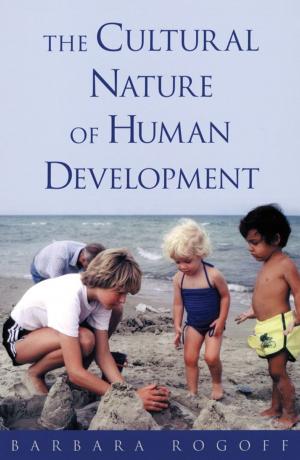Learning to Live Together
Preventing Hatred and Violence in Child and Adolescent Development
Nonfiction, Health & Well Being, Psychology, Child & Adolescent, Adolescent Psychology, Child Development| Author: | David A. Hamburg, M.D., Beatrix A. Hamburg, M.D. | ISBN: | 9780190289072 |
| Publisher: | Oxford University Press | Publication: | April 8, 2004 |
| Imprint: | Oxford University Press | Language: | English |
| Author: | David A. Hamburg, M.D., Beatrix A. Hamburg, M.D. |
| ISBN: | 9780190289072 |
| Publisher: | Oxford University Press |
| Publication: | April 8, 2004 |
| Imprint: | Oxford University Press |
| Language: | English |
With a view to deepening our understanding of sources of hatred and prejudice, this book uses a developmental and evolutionary perspective to explore and explain the process by which our beliefs are conveyed to the youngest members of society. Discussing the psychological obstacles to peaceful relations between groups, the authors focus on the developmental processes by which we can work to diminish ethnocentrism, prejudice, and hatred, which children learn from a very early age. Until now, scholarship and practice in international relations have gravely neglected crucial psychological aspects of these terrible problems and have not yet explored the educational opportunities related to them. Addressing these promising lines of inquiry and innovation, this book fosters a more humane and less violent development in childhood and adolescence. Educators, religious leaders, developmental and social psychologists, will find this a valuable resource, as will a socially concerned segment of the public who are looking for practical ways to work for peace.
With a view to deepening our understanding of sources of hatred and prejudice, this book uses a developmental and evolutionary perspective to explore and explain the process by which our beliefs are conveyed to the youngest members of society. Discussing the psychological obstacles to peaceful relations between groups, the authors focus on the developmental processes by which we can work to diminish ethnocentrism, prejudice, and hatred, which children learn from a very early age. Until now, scholarship and practice in international relations have gravely neglected crucial psychological aspects of these terrible problems and have not yet explored the educational opportunities related to them. Addressing these promising lines of inquiry and innovation, this book fosters a more humane and less violent development in childhood and adolescence. Educators, religious leaders, developmental and social psychologists, will find this a valuable resource, as will a socially concerned segment of the public who are looking for practical ways to work for peace.















